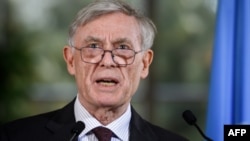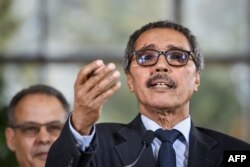A second round of U.N.-mediated talks aimed at solving the Western Sahara conflict has ended with no resolution, but with an agreement by the Moroccan and the Polisario Front delegations to meet again.
Getting parties in a dispute that has lasted 43 years to agree to keep talking is an achievement itself, albeit a small one. The U.N. mediator, former German President Horst Koehler, said there was still a lot of work ahead in the effort to end the conflict.
"Nobody should expect a quick outcome, because many positions are still fundamentally diverging," he said. "At the same time, being able to listen to each other, even when things get controversial, is an important step to build trust."
Morocco annexed the mineral-rich Western Sahara in 1975. A 16-year war between the kingdom and the indigenous Sahawari people, led by the Polisario Front, ended in 1991 with a U.N.-brokered truce. But the parties remain deeply divided.
The Polisario Front is steadfast in its demand that Western Sahara become an independent state. The delegation says its aim in the talks is to achieve its people's inalienable right to self-determination and independence.
Morocco rejects independence for Western Sahara but says it is willing to grant wide-ranging autonomy to the region.
Kohler said many people whose lives are directly affected by the conflict are placing their hope in the peace process. He said it would take genuine effort by the parties to build the trust necessary to make progress.
"The costs of this conflict, in terms of human suffering, lack of prospects for the youth and security risks, are far too high to be accepted," he said. "Therefore, we must not relent in our search for a compromise."
Kohler said the opposing delegations agree the whole Maghreb region would greatly benefit from a solution to the question of Western Sahara. He said they had agreed to meet again at a time still to be determined.





